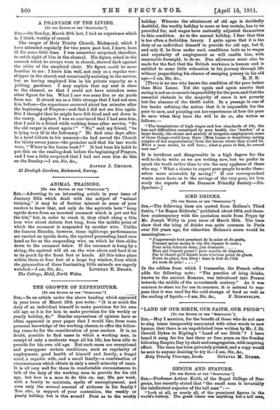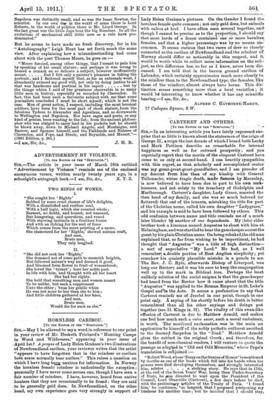GENIUS AND STATURE.
[To THE EDITOR OP THE " SPECTATOR."] SIB,—Professor Arthur Keith, of the Royal College of Sur. geons, has recently stated that " the small man is invariably the intellectual superior of the tall man " : - "Look at all, or nearly all, of the prominent figures in the world's history. The great Cesar was anything but a tall man, Napoleon was distinctly small, and so, was Sir Isaac Newton, the scientist. In our own day in the world of arms there is Lord Roberts, in the world of politics there is Mr. Lloyd George. In the last great war the little Japs beat the big Russians. In all the evolutions of Mechanical skill little men as a rule havb pre- dominated."
But he seems to have made no fresh discovery, for in his " Autobiography " Leigh Hunt has set forth much the same view. After explaining how a misunderstanding had come about with the poet Thomas Moore, he goes on :-- • " Moore fancied, among other things, that I meant to pain him by speaking of his small stature ; and perhaps it was wrong to hazard a remark on so delicate a subject, however inoffensively
meant But I felt only a painter's pleasure in taking the portrait; and I flattered myself that, as far as externals went, I abundantly evinced my good will, not only by doing justice to all
that was handsome and poetical in his aspect but by the things which I said of the greatness observable in so many little men in history, especially as recorded by Clarendon. In fact, this had been such a favourite subject with me that some journalists concluded I must be short myself; which is not the case. Men of great action, I suspect, including the most heroical soldiers, have been for the most part of short stature, from the fabulous Tydeus to Alexander and Agesilaus, and se downwards to Wellington and Napoleon. Nor have sages and poets, or any kind of genius, been wanting to the list ; from the ancient philoso- pher who was obliged to carry lead in his pockets lest he should be blown away, down to Michael Angelo, and Montaigne, and Barrow, and Spenser himself, and the Falklands and Ealeses of Clarendon, and Pope, and Steele, and Reynolds, and Mozart"— (1861 Edition, p. 281.)





































 Previous page
Previous page